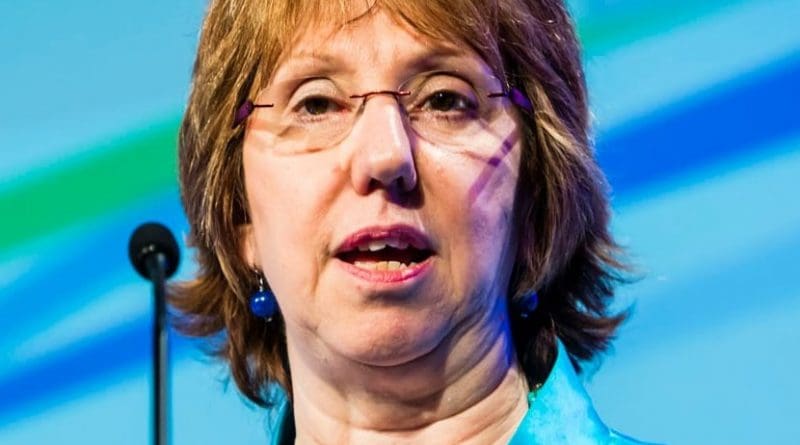Ashton Deplores Worsening EU-Russia Relations
By EurActiv
(EurActiv) — EU foreign policy chief Catherine Ashton strongly criticised Russia for its authoritarian tendencies since Vladimir Putin returned to the presidency in May, telling the European Parliament yesterday (12 September) she also welcomed the “awakening of the civil society” in the Union’s biggest neighbour.
Ashton addressed Parliament following release of the annual report on the EU’s Common Foreign and Security Policy.
Turning to Russia, she told MEPs she had encouraged Putin upon his return to the Kremlin on 7 May to engage in constructive dialogue with citizens and civil society.
Putin returned to power amid unprecedented protests against his election to a third term, seen by many as the result of widespread fraud. But the former KGB spy said he had won a “clean” victory and returned to the Kremlin after four years as prime minister (see background).
Ashton said since then, the EU had been seeing “less and less dialogue and openness on the side of the authorities, and rather more intolerance of any expression of dissenting views”.
“Instead of stronger safeguards for the exercise of fundamental rights and freedoms, we have seen a string of measures all chipping away at them,” she told MEPs meeting in Strasbourg.
She referred to legislation being pushed through the Duma, the lower chamber of the Russian parliament, at “unconstitutional speed”, saying the aim was to “further reduce the available space for independent civil and political activity in the country”.
She also mentioned amendments signed by Putin restricting the scope for demonstrations, as well as the arrests, fines and criminal charges pressed against opposition leaders.
In particular, Ashton singled out a new piece of legislation which describes Russian NGOs receiving funding from abroad as “foreign agents”.
“Given the history of such a term, foreign funding is thus considered by law to turn its recipients into ‘spies’,” she said.
“Let me state very clearly: All Russian NGOs I know would undoubtedly prefer to receive Russian funding. But there is barely any public funding available for activities that can potentially be perceived as being critical of the authorities. Nor do many businessmen dare to offer support,” Ashton said.
Wrong timing?
Ashton, however, welcomed what she called “the political awakening of Russian civil society”.
“We saw Russian civil society ready to engage in a dialogue with the government, and play an active role in the development of political institutions in the country. And we saw some signs of cautious but real dialogue between government and citizens emerging,” she said.
Turning to current affairs, she referred to the recent sentencing of three female members of the punk band Pussy Riot to two years of imprisonment, saying she had been “disgusted” about the accusations levelled against them and denouncing their imprisonment as counterproductive.
Ashton’s heated remarks about Pussy Riot may have been badly timed however. Before she spoke, Russian Prime Minister Dmitry Medvedev made public statements saying the incarceration of the musicians had lasted long enough and that keeping them in prison would be “unproductive”.
In the past, Medvedev and Putin have often played roles of “good cop – bad cop”, much to the confusion of the Western audience.
The EU’s foreign policy chief mentioned the upsurge of prosecutions of opposition activists such as blogger Alexei Navalny; the sentencing of Taisiya Osipova, an opposition figure who claims the police have planted four grammes of heroin in her home; as well as the mysterious death in prison of Sergei Magnitsky, a Russian lawyer working for a British law firm who was charged with tax evasion and fraud. His death attracted international media attention in 2009. Independent investigations uncovered what appeared to be a premeditated murder.
Economic strains
Ashton didn’t address economic relations with Russia, where tensions have been growing after the European Commission launched a probe into Gazprom’s pricing and supply practices in Europe.
On 11 September, the Kremlin threw its weight behind Gazprom, and issued a decree which could effectively block European regulators from obtaining necessary information from the company during the probe.
Under the decree signed by Putin, companies on the list of strategic enterprises and their subsidiaries should supply information to foreign countries and international organisations only with prior government consent.
EU Trade Commissioner Karel De Gucht has threatened to take Russia to the World Trade Organisation over a string of restrictive practices, saying Moscow needed to play by the rules now that it was a member of the global body.
De Gucht criticised Russia’s ban on European live animal imports, plans to levy fees on imported vehicles, two anti-dumping cases and another trade defence case launched by Moscow against Europe in recent months. Russia joined the WTO in August.

